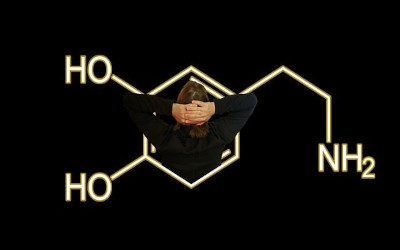Dopamine is an organic chemical, and it belongs to the same family as catecholamine and phenylethylamine. Dopamine works as a neurotransmitter. A neurotransmitter is a chemical that is released by neurons to send information to other cells. Neurotransmitters are synthesized in a specific region of the brain, but they affect the entire body. There are several different dopamine pathways in the brain, and one of them plays an essential role in the emotional component of reward-motivated behaviour. Waiting for most types of rewards increases dopamine levels in the brain. Also, a large number of addictive drugs enhance the release of dopamine or block the absorption of dopamine into neurons after the release of the transmitters. A large amount of dopamine makes us feel euphoric. Other dopamine pathways in the brain are related to motor control and the control of the release of various hormones. Dopamine doesn’t work alone. It works together with other neurotransmitters and hormones, for example, serotonin and adrenaline.
Dopamine is produced in different areas of the brain. It is released by the hypothalamus. Dopamine is produced in two steps. Firstly, the amino acid tyrosine is broken down into L-dopa. Secondly, the amino acid L-dopa goes through another change, mitigated by enzymes in the brain, eventually turning it into dopamine. Then dopamine is released into different parts of the brain. For example, into the striatum, amygdala, and prefrontal cortex. The neurons in these brain areas are linked to the nucleus accumbens, which is the main area of the brain’s reward centre.
In the media, dopamine is often said to be a chemical of pleasure and reward. It is also referred to as a “feel-good” neurotransmitter. In pharmacology, they say that dopamine indicates motivational importance, which means that you enjoy doing something or you don’t like doing it. And in turn, it drives our body’s behaviour, either to achieve that outcome or away from it. So, dopamine is released when your brain is expecting a reward.
Apart from the central nervous system, dopamine acts mainly as a cellular signal, which means that it affects the cells nearby. In the vasculature, it inhabits the release of noradrenaline, and with that, it makes our veins widen. In the kidneys, dopamine enhances the excretion of sodium and urine output. It also reduces insulin production in the pancreas. In the digestive system, it lowers the process of processing food and also helps to protect the intestinal mucosa. It also lowers the lymphocyte activity in our immune system. For these peripheral systems, dopamine is synthesized locally, except from blood vessels.
Proper amounts of dopamine usually go hand in hand with a good mood. It is perfect for learning, planning, and productivity. Dopamine helps us to be more attentive, focused, motivated, and happy. On the other hand, if you have dopamine deficiency, you might be less attentive, find it hard to concentrate, have low motivation, have poor coordination, and also have movement difficulties. Also, if you don’t have enough dopamine, it can make you sleepy. Low dopamine related conditions might be Parkinson’s disease, depression, and dopamine transporter deficiency syndrome. Also, too much dopamine is not good. On one side, it makes you feel like you are on top of the world. But it can also cause mania, hallucinations, and delusions. Excessive dopamine could be a factor in obesity, addiction, and schizophrenia.
There are different medications that help balance the dopamine levels in the brain. Depending on the type of disease being treated, the type of medicine given may enhance or inhibit dopamine effects. There are dopamine agonists that mimic dopamine, and through that, they activate the dopamine receptors. There are also dopamine antagonists. They block dopamine absorption in the brain.
There are also natural ways to balance dopamine levels in your brain. The easiest answer is to focus on a healthy lifestyle. If you have problems overindulging in certain dopamine-producing activities like technology or gambling, then you should take intentional breaks. If you have difficulties concentrating, don’t feel motivated, or feel tired, you need to start taking steps to boost your dopamine production. There are also some foods that help increase dopamine production. Scientists have found that consuming foods that are rich in the amino acid tyrosine can increase dopamine levels. Tyrosine is found in almonds, avocados, bananas, cheese, chicken, fish, milk, and yogurt. Also, exercising regularly helps to maintain dopamine levels. Exercising also helps us to sleep better, and during sleep, the dopamine levels are also balanced.

Sources:
https://en.wikipedia.org/wiki/Dopamine
https://www.healthline.com/health/dopamine-effects
https://www.verywellmind.com/what-is-dopamine-5185621
https://www.news-medical.net/health/What-is-Dopamine.aspx
https://www.zmescience.com/feature-post/health/mind-brain/why-dopamine-makes-you-happy/
